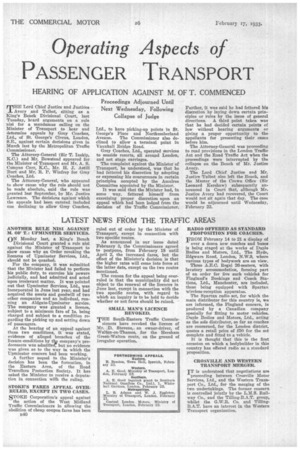Operating Aspects of PASSENGER TRANSPORT
Page 54

If you've noticed an error in this article please click here to report it so we can fix it.
HEARING OF APPLICATION AGAINST M. OF T. COMMENCED TBE Lord Chief Justice and Justices Avery and Talbot, sitting as a King's Bench Divisional Court, last Tuesday, heard arguments on a rule nisi for a mandamus calling on the Minister of Transport to hear and determine appeals by Grey Coaches, Ltd., of St. George's Circus, London, S.E., against certain decisions given in March last by the Metropolitan Traffic Commissioner.
The Attorney-General (Sir T. Inskip, K.C.) and Mr. Bowstead appeared for the Minister of Transport and Mr. A. S. Coming Carr, K.C., Mr. IL J. Astill Burt and Mr. R. P. Winfrey for Grey Coaches, Ltd.
The Attorney-General, who appeared to show Cause why the rule should not be made absolute, said the rule was granted last September, by Mr. Justice Lawrence. The decisions against which the appeals had been entered included one declining to allow Grey Coaches,
Ltd., to have picking-up points in St. George's Place and Northumberland Avenue. The Commissioner also declined to allow a terminal point in Vauxhall Bridge Road.
Grey Coaches, Ltd., operated services to seaside resorts, all around London, and not stage carriages.
The complaint against the Minister of Transport, he understood, was that he had fettered his discretion by adopting or expressing his concurrence in certain principles accepted by the Amulree Committee appointed by the Minister.
It was said that the Minister had, in some way, fettered himself from exercising proper discretion upon an appeal which bad been lodged from the decision of the Traffic Commissioner.
Further, it was said he had fettered Ms discretion by laying down certain principles or rules by the issue of general directions. A third point taken was that he had decided certain points of law without hearing arguments or giving a proper opportunity to the appellants for presenting their cases before him.
The Attorney-General was proceeding to read provisions in the London Traffic Act and the Road Traffic Act when the proceedings were interrupted by the collapse on the Bench of Mr. Justice Avery.
The Lord Chief Justice and Mr. Justice Talbot also left the Bench, and the Master of the Crown Office (Sir Leonard Kershaw) subsequently announced ill Court that, although Mr. Justice Avery had recovered, the Court would not sit again that day. The case would be adjourned until Wednesday, February 22.




























































































